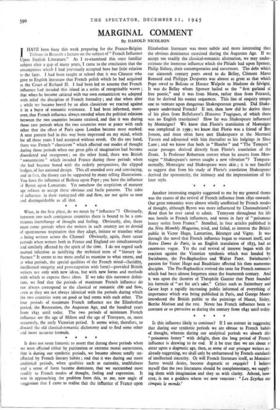Another interesting enquiry suggested to me by my general theme
was the causes of the revival of French influence from I850 onwards. Our great romantics were almost wholly unaffected by French modes of thought, although Byron was more influenced by Chateaubriand's Rene than he ever cared to admit. Tennyson throughout his life was hostile to French influences, and wrote in fury of " poisonous honey stolen from France." Stendhal, in four articles published in the New Monthly Magazine, tried, and failed, to interest the British public in Victor Hugo, Lamartine, Beranger and Vigny. It was through the novel that French influence began to reassert itself, and Notre Dame de Paris, in an English translation of 1833, had an enormous vogue. Yet the real revival of interest began with the reaction against the Victorian synthesis which was headed by Swinburne, the Pre-Raphaelites and Walter Pater. Swinbume's passion for Victor Hugo and Baudelaire affected his then numerous disciples. The Pre-Raphaelites revived the taste for French romances which had been almost forgotten since the fourteenth century. And it was upon the theories of Theophile Gautier that Pater founded his formula of "art for art's sake." Critics such as Saintsbury and Gosse kept a rapidly increasing public informed of everything of importance which was being published in Paris, and George Moore introduced the British public to the paintings of Monet, Sisley, Berthe Morisot and the rest. Never has French influence been so constant or so pervasive as during the century from 1845 until today.
* * * *






























 Previous page
Previous page